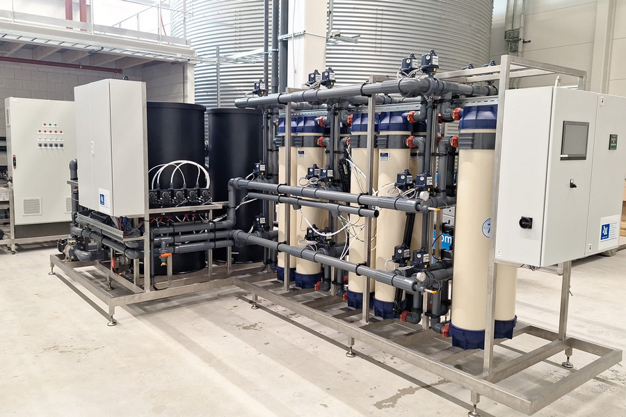The recently built Seed Connect Centre (SCC) at Rijk Zwaan location De Lier is a facility for seed processing and seed storage. This is the hub from where seeds are sent to customers all over the world.
The design of the building already factored in the minimization of the environmental impact of this new location: The roof is full of solar panels, the building is natural gas-free, and a STES system provides heating in winter and cooling in summer.
The company also prioritizes the efficient use of water. The seed extraction process requires some 200 m³ of high-quality water a day. Behind the building is a large rainwater basin, and there is also an underground rainwater buffer.
Seed extraction
All this water is needed to process fruits into seeds. Once the ripe fruits have been crushed to pulp, the seeds must be separated from the pulp by rinsing. "Previously, we used osmosis water and rainwater for this. We then disinfected this process water using UV," explains Jan Ruigrok. He is Project Leader of Technical Innovation at Rijk Zwaan, and is responsible for the development and commissioning of new machines. To this end, he reviewed a method the company had been using to see how it could be improved for the new situation. "Before the water comes in, we have to clean it completely. UV disinfection works well, but requires quite a bit of maintenance."
While it is an efficient method, UV disinfection does come with a major disadvantage for the breeding company. "Particles that have been killed remain in the process water after disinfection and that's something you don't want. So we started looking for a disinfection method that filters out all particles. And we found it in ultrafiltration."
Remote operator
Ultrafiltration is a technique that uses membranes to remove organic contaminants from water. It filters out all particles from the solution that are larger than 0.02 microns. Nematodes, fungi, bacteria, and viruses are larger and cannot pass the membrane. If the differential pressure before and after the membrane increases, a fully automatic flushing program uniquely developed by Mienis Water removes the contaminated particles.
"We asked multiple parties to present a proposal for ultrafiltration. After many discussions and company visits, we eventually opted for Mienis Water. The way they work offers us the best possible solution, comprising not only the installation itself but also remote service provision.

Our installation is a stand-alone version, controlled by a remote operator. In case of a malfunction, Mienis Water will remotely resolve the problem. They also keep the software up to date. That full-service solution is exactly what we're looking for. We placed our first order in the beginning of May."
Comprehensive tests
Rijk Zwaan did not rush into things. "In August, we ran a comprehensive test of the new installation in our Trial Centre High Tech (TCHT) in De Lier. This is where we test our new varieties and receive our customers," Ruigrok continues. "This is not about the cleaning process of the seeds, but about disinfecting the irrigation and drainage water of normal high-wire cucumber production. We tested the installation for four weeks, taking samples before and after ultrafiltration every day. The test clearly showed that the system works."
This positive result ultimately decided it and the installation was moved to the SCC in September. The assembly work was carried out by Montera Techniek. "We will now put the equipment into practice. We have found it to be a reliable system, and we hope to be able to apply this Mienis Water ultrafiltration technology in other greenhouses as well, both in the Netherlands and abroad," Ruigrok concludes.
For more information:
Mienis Water
T +31(0)172-538275
[email protected]
www.mienis-water.nl
Rijk Zwaan
[email protected]
www.rijkzwaan.com
